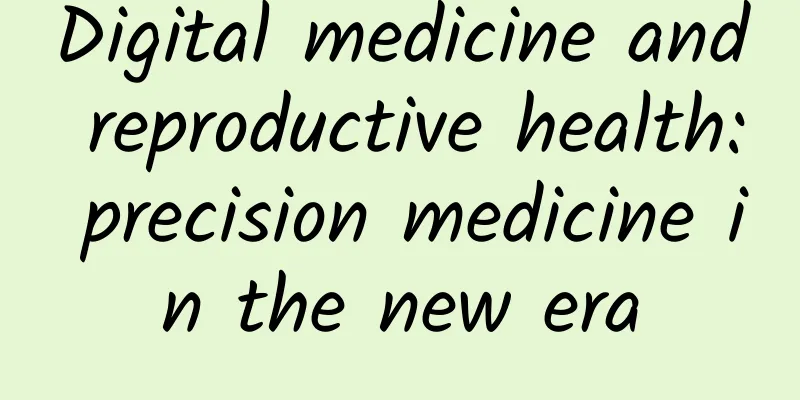Digital medicine and reproductive health: precision medicine in the new era

|
Author: Hu Xi The Second Affiliated Hospital of Kunming Medical University Liu Yang, Chief Physician, The Second Affiliated Hospital of Kunming Medical University Reviewer: Sun Chunyi, Associate Professor, The Second Affiliated Hospital of Kunming Medical University Digital medicine, as a product of the integration of modern medicine and information technology, is gradually changing the traditional medical model and has made many cutting-edge advances in the field of reproductive medicine. At present, advanced scientific and technological means such as artificial intelligence, big data, and cloud computing have been applied in reproductive medical services. It is believed that digital medicine will have a more profound impact on the future development of reproductive medicine. 1. Concept of digital medicine and its basic application in reproductive health Digital medicine is a branch of medicine that uses digital technology and information technology to collect, store, analyze and apply medical data to improve the quality and efficiency of medical services. In the field of reproductive health, digital medicine is mainly used in the diagnosis and treatment of infertility, pregnancy management, genetic disease screening and embryo development monitoring. Figure 1 Copyright image, no permission to reprint 2. Working principles and processes of digital medicine in reproductive health Data collection: The patient's physiological, behavioral and environmental data are collected through sensors, wearable devices and medical instruments. In reproductive medicine, important data such as women's menstrual cycle, ovulation, hormone levels, and men's sperm quality and quantity are collected. Data storage and transmission: Data is transmitted to the cloud via the Internet for centralized storage and management. Cloud storage technology ensures data security and reliability, and facilitates the medical team to access and share data at any time. Data analysis: Use big data technology and artificial intelligence algorithms to analyze massive medical data and extract valuable information. Clinical decision support: The analysis results are provided to doctors through the clinical decision support system to assist doctors in making diagnosis and treatment decisions. Based on the patient's specific situation, the most suitable treatment plan is recommended to improve the accuracy of diagnosis and treatment. Treatment and management: Digital medicine not only focuses on the treatment of diseases, but also emphasizes health management and disease prevention. Through remote monitoring and follow-up systems, the health status of patients can be tracked, and treatment plans can be adjusted in time to prevent the progression of the disease. 3. Specific applications of various technologies in digital medicine in reproductive health Artificial Intelligence: The application of artificial intelligence in reproductive health is mainly reflected in disease diagnosis, treatment plan recommendation and embryo selection. Artificial intelligence algorithms can quickly process massive medical data, discover potential diseases, and improve the accuracy of diagnosis and treatment. For example, by analyzing women's menstrual cycle and hormone level data, predicting ovulation, and helping women choose the best time to conceive; in assisted reproductive technology, artificial intelligence can analyze the development of embryos and select the best embryos for transplantation. Big data: Big data technology can integrate medical data from different sources, including electronic health records, genomic data, imaging data, and clinical data, and reveal the underlying patterns and risk factors of diseases through data mining and analysis. For example, the association between certain genes and infertility can be found, providing support for precision medicine. Cloud computing: Cloud computing provides powerful computing power and storage resources for digital medicine. Medical data is centrally stored and processed through cloud platforms to ensure data security and accessibility. Cloud computing also supports telemedicine and collaboration. Doctors can access patient data at any time through cloud platforms and conduct online discussions and diagnosis and treatment with other experts. Internet of Things: Internet of Things technology connects various medical devices and sensors to achieve real-time data collection and transmission. For example, monitoring women's body temperature changes can help predict ovulation; sperm analysis instruments can evaluate sperm vitality and morphology; embryo time-lapse dynamic images can help embryo evaluation and selection. These data are transmitted and stored through the Internet of Things, helping doctors understand the patient's condition and conduct remote monitoring and management. Figure 2 Copyright image, unauthorized reproduction (animated image) 4. The impact of digital medicine on the future development of reproductive health Improve the efficiency and accuracy of diagnosis and treatment: Digital medicine has improved the accuracy of reproductive disease diagnosis and the individualization of treatment plans through artificial intelligence and big data technologies. For example, by analyzing the genomic data of infertile patients through artificial intelligence algorithms, individualized treatment plans can be tailored for patients to improve treatment effects. Promote personalized medicine and precision medicine: The traditional "one-size-fits-all" treatment model is gradually being replaced by personalized medicine and precision medicine. Digital medicine develops personalized prevention, diagnosis and treatment plans through comprehensive data analysis of patients. For example, genetic testing can predict the probability of individual treatment success, eliminate avoidable treatment failures, and further improve the success rate. Promoting telemedicine and health management: Digital medicine has promoted the development of telemedicine, especially in remote areas and during the epidemic. Telemedicine has played an important role. Through remote monitoring equipment and mobile applications, patients can consult and follow up with doctors online at any time, which is convenient and fast. At the same time, digital medicine emphasizes health management, and through continuous monitoring and data analysis, it helps patients develop a healthy lifestyle and prevent the occurrence and development of reproductive diseases. Accelerate medical innovation and scientific research progress: Digital medicine provides rich data resources and powerful analysis tools for medical research, promoting medical innovation and scientific research progress. For example, through big data analysis, innovative treatment targets related to infertility can be discovered, accelerating the development of new drugs and scientific research progress. Improve the allocation of medical resources: Digital medicine improves the efficiency and fairness of medical services by optimizing the allocation of medical resources. Telemedicine and cloud computing technologies enable high-quality medical resources to be shared across regions, solving the problem of uneven distribution of medical resources. In reproductive medicine, patients in remote areas can obtain expert diagnosis and treatment services through telemedicine, improving the accessibility of reproductive health services. Figure 3 Copyright image, no permission to reprint Figure 4 Copyright image, no permission to reprint As a product of the integration of modern medicine and information technology, digital medicine is gradually changing the traditional medical model, especially in the field of reproductive health. Through advanced scientific and technological means such as artificial intelligence, big data, and cloud computing, digital medicine has shown great potential in the prevention, diagnosis, treatment, and health management of reproductive diseases. In the future, with the continuous advancement of technology and the deepening of its application, digital medicine will further promote the development of personalized medicine and precision medicine, improve the quality and efficiency of reproductive health services, and improve my country's reproductive health level and quality of life. |
<<: World Allergy Day | Children's "Self-report" on allergic rhinitis
>>: A physical examination revealed elevated "tumor markers". How far away is cancer?
Recommend
Why does leucorrhea look like tofu dregs?
Leucorrhea is a physiological phenomenon that eve...
Treatment of early stage uterine fibroids
Uterine fibroids are a common tumor of the female...
What foods are best for women during menopause?
As women age, they enter menopause. Female menopa...
Will my period stop coming after taking birth control pills?
For women who have sex but do not plan to get pre...
What causes itching in the female genital area?
Female vulvar itching is a common gynecological d...
What are the symptoms of chronic gonococcal vaginitis
Vaginitis is one of the common gynecological dise...
What ointment to use for itchy areola
The breast of a woman is a very important part of...
What kind of tea is Pu'er tea? Can Pu'er tea still be drunk after 10 years?
Pu'er tea is produced in Xishuangbanna, Linca...
How to use an air fryer? Should I use tin foil to line the air fryer?
The air fryer is a kitchen appliance, or a simple...
Clinical manifestations of menopausal syndrome
We also call menopausal syndrome menopausal syndr...
There is a small lump under my armpit that hurts when I press it. Which department should I go to?
Many people may find lumps under their armpits wh...
Why do we use clay pots to boil Chinese medicine? How long does it take to boil medicine in a clay pot?
In our daily life, when we take Chinese medicine,...
Soak your feet every day to get rid of gynecological diseases
Soaking your feet every day is very beneficial to...
Treatment of external hydrosalpinx
External hydrosalpinx can make it very difficult ...
What is fetal movement due to lack of oxygen?
Pregnant women will be very worried if they find ...









